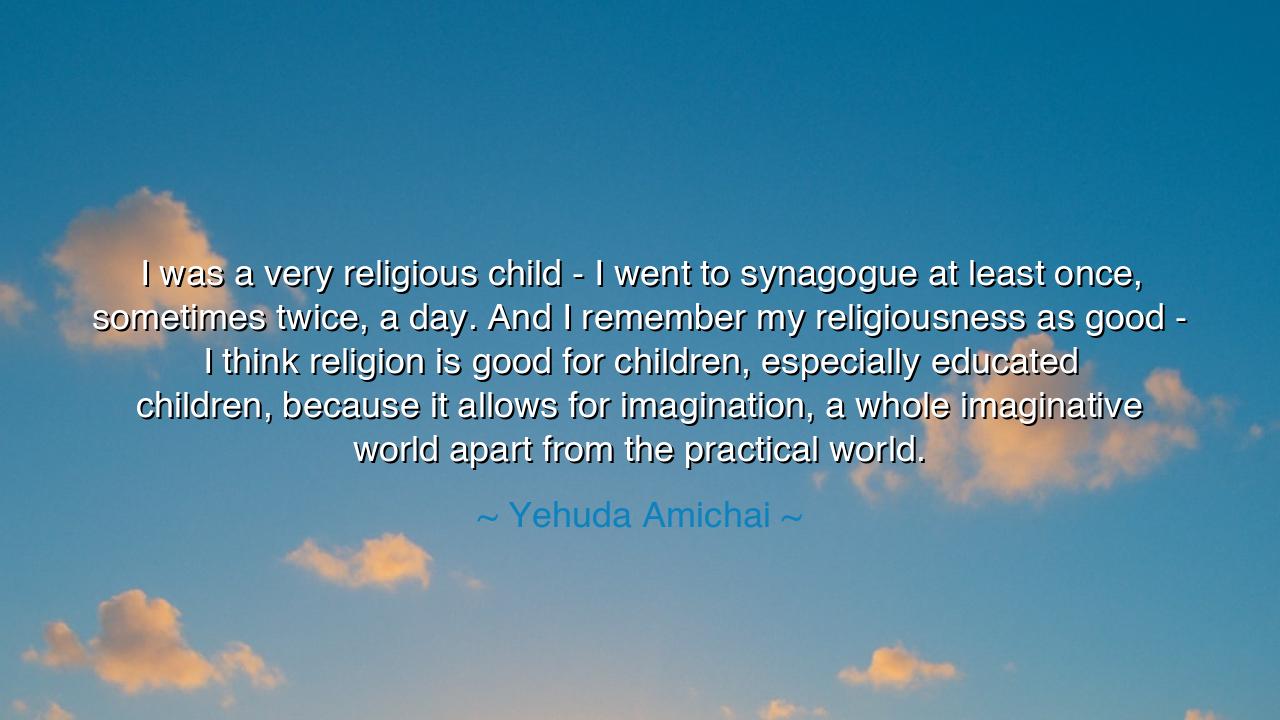
I was a very religious child - I went to synagogue at least once
I was a very religious child - I went to synagogue at least once, sometimes twice, a day. And I remember my religiousness as good - I think religion is good for children, especially educated children, because it allows for imagination, a whole imaginative world apart from the practical world.






O children of the earth, listen closely, for the words of Yehuda Amichai offer a profound insight into the power of religion and imagination, and their role in shaping the young soul. He said, *"I was a very religious child - I went to synagogue at least once, sometimes twice, a day. And I remember my religiousness as good - I think religion is good for children, especially educated children, because it allows for imagination, a whole imaginative world apart from the *practical world." In these words lies a deep understanding of how religion can serve as a sanctuary for the imagination, offering young minds a space to explore the mysteries of the divine and the universe, far beyond the confines of the practical and everyday world.
Religion, O children, has always been a means by which humans seek to connect with the divine, to understand the mysteries of existence, and to find meaning in a world that often seems chaotic and uncertain. For the young mind, religion offers not just rules and rituals, but a doorway to a world rich in symbolism, storytelling, and imaginative thinking. Amichai’s words speak to this power: that religion offers children a world that is not bound by the constraints of logic and reason, but a world that opens up to the possibilities of the spirit, where the imagination can soar freely and touch the divine.
Consider, O children, the ancient religions of the world—Judaism, Christianity, Islam, Hinduism, and others—whose sacred texts are filled with stories of gods, prophets, and divine encounters. These stories, filled with wonder and mystery, are not mere teachings; they are vehicles for imagination, opening the heart to the unknown and allowing the mind to dream of realms beyond the earthly. Just as Amichai recalls his own experience of religion as a child, so too did countless generations before him. Religion has always been a source of inspiration, a space where the child’s mind can wander freely, exploring the imaginative world that exists alongside the practical world.
Take the example of the ancient Greek philosophers, who, though deeply concerned with the practicalities of life, also drew inspiration from the gods and the mythologies of their people. Plato, in his work The Republic, spoke of an ideal world, one that was not bound by the limitations of the physical realm, but by the forms of truth and beauty. His ideas were not solely the product of rational thinking; they were also infused with the imaginative visions of a world beyond what the eye could see, a world that could only be understood through the soul’s eye. His religious and philosophical imagination was a powerful force that shaped the development of Western thought, just as Amichai’s religious upbringing shaped his own understanding of the world.
Religion, O children, provides not only a moral framework but also a creative space—a sanctuary where the young can explore the mysteries of existence without the restrictions of the practical world. Imagination, when nurtured in the context of religion, allows the child to envision worlds beyond their own, to dream of higher purposes, and to grasp the invisible threads that bind the world together. It is in these formative years, when the mind is open and receptive, that the imaginative world of religion shapes the soul, offering a foundation of meaning that will carry the child through the rest of their life.
Amichai’s words also point to the importance of education—for he notes that imagination in the context of religion is most powerful when the child is educated. Education helps the child understand not only the symbols and stories of religion but also the deeper truths they hold. The educated child can move beyond mere ritual and tradition, discovering the meaning of the stories, learning how to interpret them, and ultimately finding their own path within the imaginative world. Education thus becomes the key to unlocking the divine wisdom that religion offers, and it is through imagination that this wisdom can be fully understood.
So, O children, the lesson is clear: embrace the power of imagination, for it is in imagination that we connect with the divine, with the mysteries of the universe, and with the boundless possibilities of the human soul. Religion, when approached with an open heart and mind, is a doorway to this world—a space where the imagination can soar and the soul can explore. Just as Amichai found in his religious upbringing a source of joy and wonder, so too can you find inspiration in the sacred traditions of your own faith. Imagination is a gift, and through it, you will discover the hidden meanings of the world, the stories that speak to your soul, and the truths that lie beyond the visible horizon.
Therefore, O children, nurture your imagination, and let it guide you to higher realms of understanding. Engage with the world of religion and spirit, not as a set of rules or rituals, but as a sacred space for exploration, for creativity, and for connection with the divine. Through your imagination, you will discover that there are no limits to what you can achieve, no boundaries to what you can dream, and no end to the wisdom that can be uncovered.






AAdministratorAdministrator
Welcome, honored guests. Please leave a comment, we will respond soon